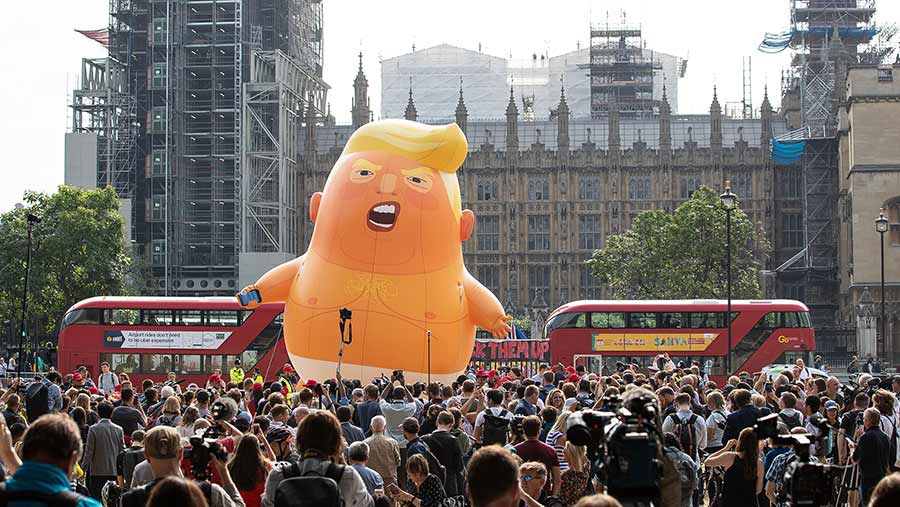Opinion: Mercurial Trump not to be trusted, says Liz Haines
 © REX/Shutterstock
© REX/Shutterstock President Trump certainly left his mark following his whirlwind three-day visit earlier this month.
During his short time in the UK, he trashed Theresa May’s Brexit negotiating strategy and poured cold water on the prospect of a lucrative free-trade deal between the US and the UK, just as her crucial White Paper on the future relationship with the European Union was published.
See also: What the Brexit White Paper has in store for farmers
The infamous Trump “baby blimp”, raised by protesters in London and Edinburgh, has presumably now descended and I hope been safely disposed of. I dread to think what could have happened if it was left to drift across the countryside like the many balloons released at protests and parades.
I have visions of herds of cattle and flocks of sheep stampeding across the horizon as the giant orange balloon looms behind them…
Mr Trump’s claim that Mrs May’s soft Brexit strategy – in which the UK would maintain close ties with the EU and stick to a free-trade common rulebook for agri-food products – would “probably kill the deal” with the US was surely a bitter pill for the prime minister to swallow.
It has certainly been jumped on by hard Brexiteers who claim that the whole point of leaving the EU was to open up trade deals with other countries, unencumbered by its strict rules and regulations.
Yet only a couple of days later, in typically mercurial fashion, Mr Trump was apparently backtracking on what he had said, telling TV presenter Piers Morgan: “We would make a great deal with the UK because they have product that we like. They make phenomenal things… Even your farm product is so fantastic.”
Talk about damning us farmers with faint praise… or perhaps we should count ourselves lucky to have gotten a mention at all.
At any rate, the president’s home record on agriculture and trade deals more generally suggests we should enter into any deal with caution.
America’s agricultural heartlands provided key votes for Trump, but his claim in a Tweet in June that “I am fighting for a level playing field for our farmers, and I will win” is now being strongly tested.
His escalating trade war with major partners, including Canada, Mexico and China, has put farmers in the firing line for retaliation in a dispute that doesn’t even involve their products.
China has already responded to steel and aluminium tariffs with a tariff on pork, and soybean sales have also been affected.
Mr Trump has also proposed to shrink the US Department of Agriculture budget by 21%; his anti-immigration policies are bound to exacerbate the national shortage of farm workers; and he has overseen the withdrawal of rules proposed by Barack Obama which would have protected farmers from predatory practices by the giant agri-businesses that control the US food market.
It seems that most of Mr Trump’s policies are geared towards supporting these giant corporations, rather than the family farmers who voted for him.
As Joe Maxwell, executive director of the US Organization for Competitive Markets, has stated: “Simply because agri-business is doing well on Wall Street does not mean family farmers are receiving any piece of that growth or prosperity.”
For the UK, although Mrs May’s White Paper means sticking with many of the EU’s strict standards and regulations while potentially losing the ability to influence them, it may well be a case of “better the devil you know”.
